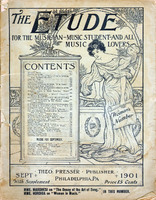Of the many hundreds of women who officiate as church-organists throughout the length and breadth of this country, there are very few, indeed, who have ventured into the field as concert-organists. In fact, they might almost be counted on the fingers of one hand. This hesitancy on the part of women organists to enter the more exacting concert-field is due to a number of reasons.
If we consider what is required to become a proficient concert-organist, we will find necessary, after years of preparatory work, good health, plenty of time, regular daily practice, power of concentration of mind, a broad musical education, a knowledge of one’s own ability and limitations, and freedom from too many other cares.
The prejudice against women as church-organists is fast disappearing, since the new woman has proved herself in this line, as in others, to be fully equal to the demands of the average organ-loft in church-service. The church-organist is, however, in most cases obliged to make her church-position a side-issue, and spends most of her time and strength in teaching the piano, obliged to get along from Sunday to Sunday with only the least possible preparation. There are many exceptions, however, and many talented women who are able to give occasional recitals and are organists of taste and ability.
But to launch forth as a concert-organist, to be ready to “open a new organ,” to make an old one sound like new, to be able to adapt oneself to all sorts and conditions of organs with only an hour or two in which to become familiar with them, to have a repertoire large and varied enough to give a series of weekly recitals once or twice a year with few repetitions and the frequent introduction of novelties, means work—constant work.
Considering the preparation necessary for concert- playing, how many women apply themselves to the thorough study of the works of Bach? Is not Bach the supreme test of organ-playing? In the study of his works is there not a foundation laid upon which all other organ-music is builded?
Alexandre Guilmant has said: “I consider that Bach is music. Everything else in music has come from him; and, if all music excepting Bach’s were to be destroyed, music would still be preserved.”
Who is there who does not feel proud to be able to play the organ-works of Bach, Handel, Mendelssohn, Merkel, Franck, Rheinberger, Guilmant, and Widor? And yet there are comparatively few women who are able, either from lack of time, strength, ability, or inclination, to follow this line of study. There are few, indeed, who are willing to make a speciality of organ-playing. It has been fully demonstrated that to be both a concert-pianist and concert-organist is well-nigh impossible, and, fascinating as the study of the organ is, it requires something of a sacrifice to give up the playing of the piano in concert. Hence it is rarely done.
In order to feel the necessary reserve force, the command of oneself, one must be able to rise above the thought of technical difficulties. In order to impress an audience, one must herself be impressed; and this feeling of power comes only from incessant study and practice.
One important feature of concert-work is the arrangement of the programs. It would be easy enough merely to tickle the ears of the average audience,—to play orchestral overtures adapted to the organ with plenty of fire-works; to play arrangements of piano-pieces, transcriptions of love-songs, variations on familiar melodies, etc.,—but would it be best? Should not programs be educational and elevating?
In regard to the playing of only pure organ-music, Guilmant has also said: “With a fine execution, the public appreciates music written especially for the organ, and it is not necessary to have recourse to transcriptions from operas and other things which have no relation to the true style of the noble instrument.”
Speaking of the prejudice or lack of confidence of the world in the ability of a woman to play the organ with anything like the broad grasp and understanding of a man, I may be pardoned if I cite an instance in my own experience.
I was invited to give a recital before a Music Teachers’ State Convention some years ago, and, while quite unknown to the majority of the members present, had a few friends who had faith enough in my ability to encourage my appearance. Several men had played during the convention who had left nothing better to be desired. So, when I mounted the organ-bench in my turn, one of the prominent men in the Association said to those around him (as he afterward told me): “Well, is not this to be a case of good-Lord-deliver-us?” I had scarcely played the last chord of my final number when he was by the side of the organ, offering me his hand and in the heartiest manner congratulating me on my playing, thus frankly acknowledging that in this case, at least, his prejudice against a woman organist had been overcome.
The expression is often used that Women are not strong enough to play the organ. In this time of almost mechanical perfection the modern organ does not require more strength than does a piano. What is required is facility of motion, quickness of perception, good judgment, and good health.
As a usual thing, judicious organ-practice strengthens the muscles of the back and limbs, exercising quite generally the muscles of the entire body.
Hence there seems to be no reason why women should not succeed as concert-organists, provided they have sufficient talent, time, and strength to devote to its exacting requirements.—Mary Chappell Fisher.



